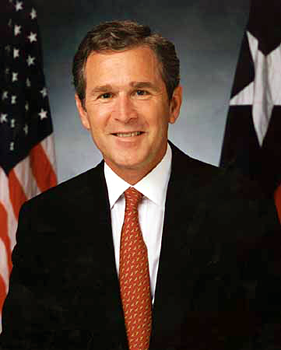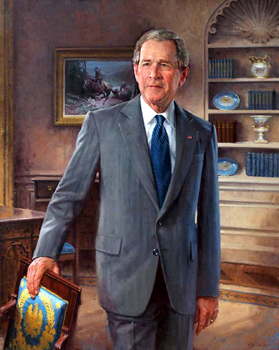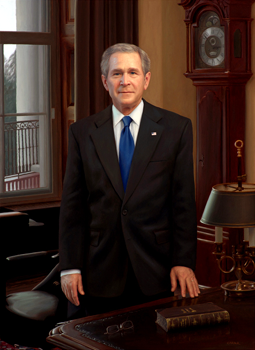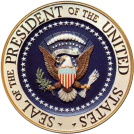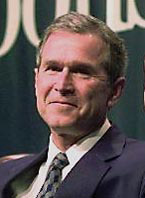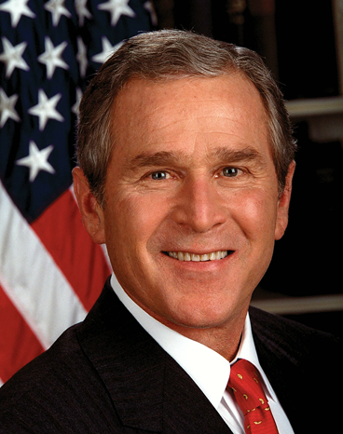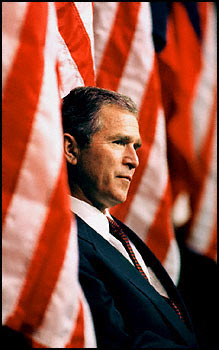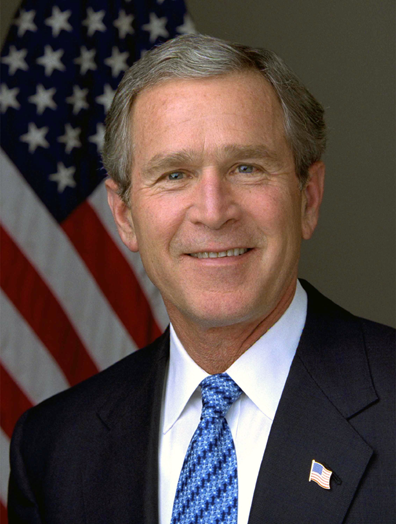|
GEORGE W. BUSH |
|
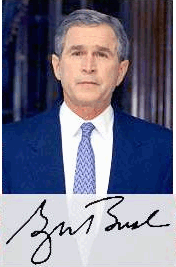
THE 43RD PRESIDENT OF
THE UNITED STATES OF AMERICA
(2001-2009)
BUSH, George W(alker)
(1946– ), 43rd president of the U.S. (2001–2009). The eldest son of George H. W. Bush, 41st president of the U.S. (1989–93), he is the first son of a former president to win the White House since John Quincy Adams in 1824.
Early Career.
Born on July 6, 1946, in New Haven, Conn., he spent most of his childhood first in Midland and then in Houston, Tex. He earned his undergraduate degree from Yale, the same university his father had attended, and fulfilled his military service requirement with the Texas Air National Guard (1968–73). After earning a master’s degree in business administration from the Harvard Business School, he returned to Midland in 1975, hoping, like his father, to make his fortune in the oil industry. On November 5, 1977 he married a schoolteacher and librarian, Laura Lane Welch (1946– ). He lost a bid for the U.S. House of Representatives the following year. On November 25, 1981, Laura Bush gave birth to fraternal twin daughters, Barbara Pierce Bush and Jenna Welch Bush.
Bush’s rapid financial and political ascent did not begin until 1986, when he turned 40, swore off alcohol, and renewed his Christian faith. A business deal with Harken Oil and Gas, a Dallas-based firm, offered him the financial stake he needed, and after assisting in his father’s 1988 presidential campaign, he became managing partner of the Texas Rangers professional baseball team in 1989. He was elected governor of Texas in 1994, unseating a popular Democrat incumbent, and won a landslide reelection victory in 1998, the same year his brother Jeb Bush (1953– ) was elected governor of Florida.
Governor of Texas.
In 1988, George W. Bush moved his family to Washington DC to work on his father’s bid for the White House, participating in campaign activities and meeting influential people. After his father’s victory, he returned to Texas, and in 1989 joined a group of investors purchasing the Texas Rangers baseball team. George W. Bush quickly emerged as the group’s leader and made some savvy trades. The team did well and Bush earned a reputation as a successful businessman. In 1998, Bush sold his share of the team for a reported 17 times his initial investment. After his father’s 1992 reelection loss to Bill Clinton, George W. Bush decided to run for governor of Texas as a Republican. His affiliation with the Rangers and his family reputation helped him in the 1994 campaign against incumbent Democrat Ann Richards. His campaign focused on welfare and tort reform, crime reduction, and education improvement. The contest was contentious and bare knuckled, with accusations of financial impropriety on one side, and homosexuality on the other. Bush won the election with 53 percent of the vote and became the first child of a U.S. president to be elected a state governor. In 1998, Bush became the first Texas governor to be elected to consecutive four-year terms. As governor, George W. Bush appealed to moderate Republicans and Christian conservatives in his own party and earned a reputation for bipartisan governing. He implemented the philosophy of "compassionate conservatism," which combined limited government with concern for the underprivileged and personal responsibility. The previous gubernatorial administration left the Texas treasury in a surplus, so Bush pushed for a tax cut and increased funding for education. He promoted educational reform, tying teachers’ salaries to student performance on standardized tests, and signed into law legislation lowering the age at which juveniles could be tried in adult courts.
The 2000 Election.
Campaigning as a "compassionate conservative" in 2000, Bush won the Republican presidential nomination and, together with his vice-presidential running mate, Richard B. Cheney, went on to defeat the Democratic ticket of Al Gore and Joseph I. Lieberman. The victory was not sealed until, with the aid of a mid-December ruling from the U.S. Supreme Court, Florida’s electoral votes were safely credited to Bush’s column. The presidential contest was the first since 1888 in which the electoral-college winner failed to finish first in the popular vote. After the Supreme Court ruling, Bush stressed the theme of reconciliation, noting that he was "not elected to serve one party, but to serve the nation."
Bush as President.
Bush took office on Jan. 20, 2001, and enjoyed an early legislative success when Congress passed a $1.35-trillion tax-reduction measure, intended to stimulate the lagging U.S. economy. For the first four months of his term, the president’s Republican allies controlled both the House and the Senate. That changed in late May, when Vermont Senator James M. (Jim) Jeffords (1934– ) announced that he would leave the Republican party and become an independent, shifting the balance in the Senate to the Democrats; when the switch became official in early June, Thomas A. (Tom) Daschle (1947– ), a South Dakota Democrat, replaced Trent Lott (1941– ), a Mississippi Republican, as Senate majority leader. In August, Bush dealt with a growing national controversy between medical researchers and antiabortion group by agreeing to authorize federal funds for human embryonic stem cell research, but only for cell lines that already existed on Aug. 9, 2001. He would not allow funding for the creation of new cell lines.
In foreign affairs, the administration broke with its allies by opposing measures that would control global warming and enforce a ban on biological weapons, and by signaling its intention to withdraw from the Anti-Ballistic Missile Treaty Arms Control, International) in order to build a large-scale missile-defense system. While Bush’s political experience was mainly in the domestic area, he assembled a seasoned team of foreign policy and national security advisers that included Cheney, Secretary of State Colin Powell, and National Security Adviser Condoleezza Rice (1954– ), all of whom had served in his father’s administration, and Secretary of Defense Donald Rumsfeld (1932– ), who held the same post under President Gerald R. Ford.
9/11 - America attacked and Afghanistan War.
On the morning of Sept. 11, 2001, Bush confronted a challenge previously faced by no U.S. president: responding to a surprise aerial assault against two major metropolitan areas on the U.S. mainland. Unlike the Japanese attack on Pearl Harbor in 1941, this onslaught came not from the air force of a foreign government but from terrorists who, acting in concert, hijacked four large commercial aircraft and sought to use them as weapons of mass destruction against U.S. civilian and military targets. Two of the aircraft rammed the twin towers of the World Trade Center in New York City, leading to the collapse of the two 110-story structures; a third jetliner struck Department of Defense headquarters at the Pentagon, near Washington, D.C., seriously damaging one side of the five-sided structure; and a fourth crashed in a farmer’s field in Pennsylvania, apparently brought down after the hijacked passengers struggled with the hijackers. A total of more than 4500 people lost their lives. (Because of the extent of the World Trade Center wreckage, the exact death toll may never be known.)
Fearful for the safety of the president, who was in Florida when the day began, the Secret Service flew Bush to U.S. Air Force bases in Louisiana and Nebraska, while Cheney, Rice, Rumsfeld, and other top administration officials remained in Washington. Bush returned to the White House to give a nationally televised address that night in which he pledged that the U.S. would find and punish the perpetrators and would "make no distinction between the terrorists who committed these acts and those who harbor them."
A comprehensive strategy was formed with the creation of the Homeland Security Department, the Patriot Act and the authorization of intelligence gathering that, for a time, included monitoring international phone calls made by U.S. citizens.
The attackers were al-Qaeda, an Islamic extremist and terrorist group led by a wealthy Saudi businessman, Osama bin Laden (1957–2011), the Bush administration worked to organize a worldwide coalition not only against the terrorists but also against the Taliban regime in Afghanistan, which was harboring bin Laden. Bush and his top advisers repeatedly cautioned that the war against terrorism would demand patience and would be fought using financial and political as well as military assets. On October 7 the U.S., with British assistance, launched a sustained campaign of aerial bombardment against the Taliban; by the end of the month, defense officials acknowledged that a small number of U.S. ground troops were operating on Afghan soil.
As the conflict raged on, United States military forces in Afghanistan began transferring Taliban fighters and suspected Al Qaeda members to a special prison at Guantánamo Bay, Cuba, a permanent U.S. naval base. Hundreds of prisoners were held there as enemy combatants, a classification given by the Bush administration that stated terror detainees were not protected by the Geneva Conventions. As a result, many were subject to enhanced interrogation techniques, which in the opinion of various international organizations, including the Red Cross, amounted to torture.
Diplomacy associated with the war effort dominated the administration’s revamped foreign policy agenda, and Bush journeyed to Shanghai in mid-October to press the U.S. case at the Asia-Pacific Economic Cooperation (APEC) summit and in his first face-to-face talks with Chinese leaders.
In December 2001, the Pentagon reported that the Taliban had been defeated, but cautioned that the war would go on to continue weakening Taliban and al-Qaeda leaders. Later that month the UN had installed the Afghan Transitional Administration chaired by Hamid Karzai. In 2002, based onUNICEF figures, Nicholas Kristof reported that "our invasion of Afghanistan may end up saving one million lives over the next decade" as the result of improved healthcare and greater access to humanitarian aid.
Efforts to kill or capture al-Qaeda leader Osama bin Laden failed as he escaped a battle in December 2001 in the mountainous region of Tora Bora, which the Bush Administration later acknowledged to have resulted from a failure to commit enough U.S. ground troops. It was not until May 2011, two years after Bush left office, that bin Laden was killed by U.S. forces. Bin Laden's successor, Ayman al-Zawahiri, as well as the leader of the Taliban, Mohammed Omar, remain at large.
Despite the initial success in driving the Taliban from power in Kabul, by early 2003 the Taliban was regrouping, amassing new funds and recruits. In 2006, the Taliban insurgency appeared larger, fiercer and better organized than expected, with large-scale allied offensives such as Operation Mountain Thrust attaining limited success. As a result, Bush commissioned 3,500 additional troops to the country in March 2007.
On the domestic front, Congress passed and Bush signed a $40-billion emergency appropriation to fund military operations and reconstruction efforts, and a $15-billion bailout package to keep the nation’s troubled airline industry aloft. Bush also established a new Office of Homeland Security, to coordinate the antiterrorism efforts of nearly four dozen existing federal agencies; signed legislation that greatly expanded the authority of federal law enforcement officials to investigate and detain those suspected of terrorism or other illegal activities; and took steps to deal with the bioterrorist threat posed by anthrax contaminated letters contaminated with anthrax and mailed to several U.S. media firms and public figures, including Senate Majority Leader Daschle. Meanwhile, the administration moved to address the broader economic impact of the war, which had turned the U.S. economic slowdown into a full-fledged recession.
Iraq War.
Beginning with his January 29, 2002 State of the Union address, Bush began publicly focusing attention on Iraq, which he labeled as part of an "axis of evil" allied with terrorists and posing "a grave and growing danger" to U.S. interests through possession of weapons of mass destruction.
In the latter half of 2002, CIA reports contained assertions of Saddam Hussein's intent of reconstituting nuclear weapons programs, not properly accounting for Iraqi biological and chemical weapons, and that some Iraqi missiles had a range greater than allowed by the UN sanctions. Contentions that the Bush Administration manipulated or exaggerated the threat and evidence of Iraq's weapons of mass destruction capabilities would eventually become a major point of criticism for the president.
In September, 2002, the Bush administration announced that the United States would preemptively use military force if necessary to prevent threats to its national security by terrorists or "rogue states" especially any that possessed weapons of mass destruction.
In late 2002 and early 2003, Bush urged the United Nations to enforce Iraqi disarmament mandates, precipitating a diplomatic crisis. In November 2002, Hans Blix and Mohamed ElBaradei led UN weapons inspectors in Iraq, but were advised by the U.S. to depart the country four days prior to the U.S. invasion, despite their requests for more time to complete their tasks. The U.S. initially sought a UN Security Council resolution authorizing the use of military force but dropped the bid for UN approval due to vigorous opposition from several countries.
More than 20 nations (most notably the United Kingdom), designated the "coalition of the willing" joined the United States in invading Iraq. They launched the invasion on March 20, 2003. The Iraqi military was quickly defeated. The capital, Baghdad, fell on April 9, 2003. On May 1, Bush declared the end of major combat operations in Iraq. The initial success of U.S. operations increased his popularity, but the U.S. and allied forces faced a growing insurgency led by sectarian groups; Bush's "Mission Accomplished" speech was later criticized as premature. From 2004 until 2007, the situation in Iraq deteriorated further, with some observers arguing that there was a full-scale civil war in Iraq. Bush's policies met with criticism, including demands domestically to set a timetable to withdraw troops from Iraq. The 2006 report of the bipartisan Iraq Study Group, led by James Baker, concluded that the situation in Iraq was "grave and deteriorating". While Bush admitted that there were strategic mistakes made in
regards to the stability of Iraq, he maintained he would not change the overall Iraq strategy.
In January 2005, free, democratic elections were held in Iraq for the first time in 50 years. According to Iraqi National Security Advisor Mowaffak al-Rubaie, "This is the greatest day in the history of this country." Bush praised the event as well, saying that the Iraqis "have taken rightful control of their country's destiny". This led to the election of Jalal Talabani as President and Nouri al-Maliki as Prime Minister of Iraq. A referendum to approve a constitution in Iraq was held in October 2005, supported by most Shiites and many Kurds.
On January 10, 2007, Bush announced a surge of 21,500 more troops for Iraq, as well as a job program for Iraqis, more reconstruction proposals, and $1.2 billion for these programs. On May 1, 2007, Bush used his second-ever veto to reject a bill setting a deadline for the withdrawal of U.S. troops, saying the debate over the conflict was "understandable" but insisting that a continued U.S. presence there was crucial.
In March 2008, Bush praised the Iraqi government's "bold decision" to launch the Battle of Basra against the Mahdi Army, calling it "a defining moment in the history of a free Iraq". He said he would carefully weigh recommendations from his commanding General David Petraeus and Ambassador Ryan Crocker about how to proceed after the end of the military buildup in the summer of 2008. He also praised the Iraqis' legislative achievements, including a pension law, a revised de-Baathification law, a new budget, an amnesty law, and a provincial powers measure that, he said, set the stage for the Iraqi elections. By July 2008, American troop deaths had reached their lowest number since the war began, and due to increased stability in Iraq, Bush announced the withdrawal of additional American forces.
Saddam Hussein. (28 April 1937 – 30 December 2006)
Capture and incarceration.
In April 2003, Saddam's whereabouts remained in question during the weeks following the fall of Baghdad and the conclusion of the major fighting of the war. Various sightings of Saddam were reported in the weeks following the war, but none was authenticated. At various times Saddam released audio tapes promoting popular resistance to his ousting.
Saddam was placed at the top of the U.S. list of "most-wanted Iraqis". In July 2003, his sons Uday and Qusay and 14-year-old grandson Mustapha were killed in a three-hour gunfight with U.S. forces.
On 13 December 2003, Saddam Hussein was captured by American forces at a farmhouse in ad-Dawr near Tikrit in a hole in Operation Red Dawn. Following his capture on 13 December Saddam was transported to a U.S. base near Tikrit, and later taken to the American base near Baghdad. The day after his capture he was reportedly visited by longtime opponents such as Ahmed Chalabi.
On 14 December 2003, U.S. administrator in Iraq L. Paul Bremer confirmed that Saddam Hussein had indeed been captured at a farmhouse in ad-Dawr near Tikrit. Bremer presented video footage of Saddam in custody.
Saddam was shown with a full beard and hair longer than his familiar appearance. He was described by U.S. officials as being in good health. Bremer reported plans to put Saddam on trial, but claimed that the details of such a trial had not yet been determined. Iraqis and Americans who spoke with Saddam after his capture generally reported that he remained self-assured, describing himself as a "firm, but just leader."
British tabloid newspaper The Sun posted a picture of Saddam wearing white briefs on the front cover of a newspaper. Other photographs inside the paper show Saddam washing his trousers, shuffling, and sleeping. The United States government stated that it considers the release of the pictures a violation of the Geneva Convention, and that it would investigate the photographs. During this period Hussein was interrogated by FBI agent George Piro.
The guards at the Baghdad detention facility called their prisoner "Vic," and let him plant a little garden near his cell. The nickname and the garden are among the details about the former Iraqi leader that emerged during a 27 March 2008 tour of prison of the Baghdad cell where Saddam slept, bathed, and kept a journal in the final days before his execution.
Trial.
On 30 June 2004, Saddam Hussein, held in custody by U.S. forces at the U.S. base "Camp Cropper", along with 11 other senior Ba'athist leaders, were handed over legally (though not physically) to the interim Iraqi government to stand trial for crimes against humanity and other offences.
A few weeks later, he was charged by the Iraqi Special Tribunal with crimes committed against residents of Dujail in 1982, following a failed assassination attempt against him. Specific charges included the murder of 148 people, torture of women and children and the illegal arrest of 399 others.
Among the many challenges of the trial were:
- Saddam and his lawyers' contesting the court's authority and maintaining that he was still the President of Iraq.
- The assassinations and attempts on the lives of several of Saddam's lawyers.
- The replacement of the chief presiding judge, midway through the trial.
On 5 November 2006, Saddam Hussein was found guilty of crimes against humanity and sentenced to death by hanging. Saddam's half brother, Barzan Ibrahim, and Awad Hamed al-Bandar, head of Iraq's Revolutionary Court in 1982, were convicted of similar charges. The verdict and sentencing were both appealed, but subsequently affirmed by Iraq's Supreme Court of Appeals.
Execution.
Saddam was hanged on the first day of Eid ul-Adha, 30 December 2006, despite his wish to be shot (which he felt would be more dignified). The execution was carried out at Camp Justice, an Iraqi army base in Kadhimiya, a neighborhood of northeast Baghdad.
The execution was videotaped on a mobile phone and his captors could be heard insulting Saddam. The video was leaked to electronic media and posted on the Internet within hours, becoming the subject of global controversy. It was later claimed by the head guard at the tomb where his body remains that Saddam's body was stabbed six times after the execution.
A second unofficial video, apparently showing Saddam's body on a trolley, emerged several days later. It sparked speculation that the execution was carried out incorrectly as Saddam Hussein had a gaping hole in his neck.
Saddam was buried at his birthplace of Al-Awja in Tikrit, Iraq, 3 km (2 mi) from his sons Uday and Qusay Hussein, on 31 December 2006.
Second Term as President.
In 2004, George W. Bush ran for re-election. Though the wars in Iraq and Afghanistan were not going well, and his efforts in Social Security reform had met with great resistance, Bush's political core remained supportive, and he was able to win reelection over Democratic challenger Senator John Kerry in the November election. During his second term, Bush pushed for immigration reform, which received criticism from many conservatives, and eased environmental regulations, which received criticism from many liberals. The Bush administration's poor response to Hurricane Katrina in New Orleans further pushed down his favorability rating.
In 2008, as George W. Bush entered the final year of his presidency, the country faced enormous challenges. The United States was fighting two foreign wars, and the budget surplus left by the Clinton administration had transformed into a multi-trillion-dollar debt—the effects of military spending, tax cuts, and slow economic growth. In the early fall of 2008, the country was hit with a severe credit crisis that sent the stock market into free fall and led to massive layoffs. The Bush administration scrambled and encouraged Congress to enact a controversial $700 billion Emergency Economic Stabilization Act to bail out the housing and banking industries.
Assassination attempts.
On May 10, 2005, Vladimir Arutyunian, a native Georgian who was born to a family of ethnic Armenians, threw a live hand grenade toward a podium where Bush was speaking at Freedom Square in Tbilisi, Georgia. Georgian President Mikheil Saakashvili was seated nearby. It landed in the crowd about 65 feet (20 m) from the podium after hitting a girl, but it did not detonate. Arutyunian was arrested in July 2005, confessed, was convicted and was given a life sentence in January 2006.
February 7, 2001: While President George W. Bush was in the White House, Robert Pickett stood outside the fence and shot several times toward the building. The U.S. Park Police said, according to CNN correspondent Eileen O'Connor, that they confiscated a sophisticated handgun and, had the shooter not been at an obstructed angle view, he could have reached targets in the White House. Following a stand-off of about ten minutes, a Secret Service officer shot Pickett, wounding him. Pickett was then immediately taken to a hospital for surgery. Pickett was found to have emotional problems and employment grievances. Pickett had previously written letters to the President about these grievances. A court in July 2001 sentenced Pickett to three years imprisonment in connection with the incident.
September 11, 2001: On the morning of the September 11 attacks, President George W. Bush was at the Colony Beach and Tennis Resort on Longboat Key, Florida. He woke up around 6:00 AM and prepared for his morning jog. Men of apparent Middle Eastern descent arrived at the Colony Beach Resort and claimed they had a "poolside" interview with the President. Lacking an appointment, they were turned away. Time magazine suggested they were there for an assassination attempt modeled on one used against the Northern Alliance military leader Ahmed Massoud two days earlier. Witnesses have recalled seeing 9/11 hijacker ringleader Mohamed Atta in the Longboat Key Holiday Inn a short distance from where Bush was staying as recently as September 7, the day Bush's Sarasota appearance was publicly announced.
About three hours after the possible assassination attempt, Bush was making a scheduled appearance at a nearby elementary school when the main 9/11 attacks began.
Hurricane Katrina.
Hurricane Katrina, one of the most damaging natural disasters in U.S. history, struck early in Bush’s second term. Katrina formed in late August during the 2005 Atlantic hurricane season and devastated much of the north-central Gulf Coast of the United States, particularly New Orleans.
Bush declared a state of emergency in Louisiana on August 27, and in Mississippi and Alabama the following day; he authorized the Department of Homeland Security (DHS) and Federal Emergency Management Agency (FEMA) to manage the disaster, but his announcement failed to spur these agencies to action. The eye of the hurricane made landfall on August 29, and New Orleans began to flood due to levee breaches; later that day, Bush declared that a major disaster existed in Louisiana, officially authorizing FEMA to start using federal funds to assist in the recovery effort. On August 30, DHS Secretary Michael Chertoff declared it "an incident of national significance", triggering the first use of the newly created National Response Plan. Three days later, on September 2, National Guard troops first entered the city of New Orleans. The same day, Bush toured parts of Louisiana, Mississippi, and Alabama and declared that the success of the recovery effort up to that point was "not enough".
As the disaster in New Orleans intensified, critics charged that Bush was misrepresenting his administration's role in what they saw as a flawed response. Leaders attacked Bush for having appointed apparently incompetent leaders to positions of power at FEMA, notably Michael D. Brown; it was also argued that the federal response was limited as a result of the Iraq War and Bush himself did not act upon warnings of floods. Bush responded to mounting criticism by accepting full responsibility for the federal government's failures in its handling of the emergency. It has been argued that with Katrina, Bush passed a political tipping point from which he would not recover.
Life After the White House.
George W. Bush left office in January, 2009, leaving behind much unfinished business and low approval ratings. The country remained politically divided. Critics laid much of the country’s misfortunes at his feet, while supporters defended him for his strong leadership during one of the country’s most dangerous periods. Bush and his wife settled in Dallas, Texas, where he participated in the building of his presidential library and wrote his memoir "Decision Points." At the request of President Barack Obama, Bush and former presidentBill Clinton led private fundraising efforts in the United States for disaster relief, after the 2010 Haiti earthquake.
After years of leading a relatively quiet life in Texas, Bush returned to the media spotlight in 2013. He was on hand for the opening of the George W. Bush Library and Museum on the grounds of Southern Methodist University in Dallas, Texas. The other living former presidents, including Bill Clinton and Bush's own father, attended the event as did President Barack Obama. Bush joked that "There was a time in my life when I wasn't likely to be found at a library, much less found one," according to Fox News. Speaking on a more serious note, Bush seemed to defend his time as president. "When people come to this library and research this administration, they’re going to find out we stayed true to our convictions," he said.
George W. Bush played up to his Texas roots through most of his political life. For both his supporters and detractors, it provided reasons for their support and criticism.
For some, his folksy image and manner suggested he was "not ready for prime time," politically adept, but not a statesman at a time when the country need one. For others, he was perceived as a president of big ideas who eagerly embraced large visions and the risks involved. His supporters credit him with re-establishing America’s place as the world’s uncontested leader. Internationally, he has been maligned for his "cowboy diplomacy" in foreign affairs. Like many presidents before him,
The George W. Bush presidency will find its place in history balanced against his successes and failures.
In July 2013, George W. Bush made history when he joined President Barack Obama in Africa in commemoration of the 15th anniversary of Osama bin Laden's first attack on the United States—marking the first meeting on foreign soil to commemorate an act of terrorism between two U.S. presidents.

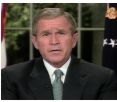
See my other GEORGE W. BUSH webpage @ my Remembering 9-11 webpage. Also my Remembering 9-11 webpage.
